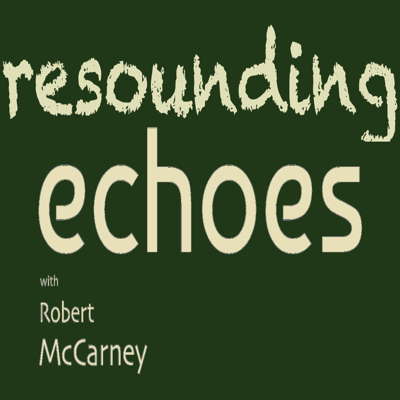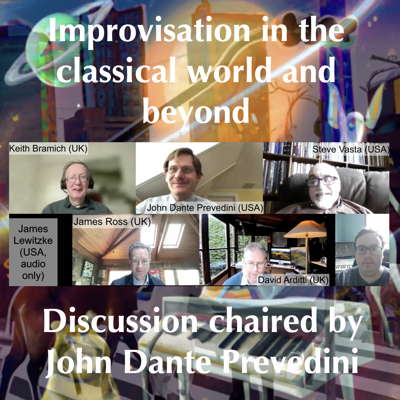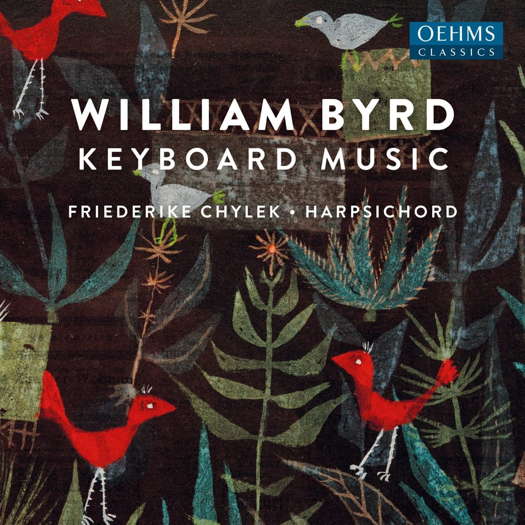- Rudolf Kehrer
- Roy Wales
- Carlo Lepore
- Happy Christmas
- music festivals
- Bill Strayhorn: Take the A Train
- Seong-Jin Cho
- Vato Klemera: Yours and Mine
 RESOUNDING ECHOES: Beginning in 2022, Robert McCarney's occasional series features little-known twentieth century classical composers.
RESOUNDING ECHOES: Beginning in 2022, Robert McCarney's occasional series features little-known twentieth century classical composers.
 DISCUSSION: John Dante Prevedini leads a discussion about Improvisation in the classical world and beyond, including contributions from David Arditti, James Lewitzke, James Ross and Steve Vasta.
DISCUSSION: John Dante Prevedini leads a discussion about Improvisation in the classical world and beyond, including contributions from David Arditti, James Lewitzke, James Ross and Steve Vasta.

Preserving Byrd's Momentum
JOHN DANTE PREVEDINI listens to William Byrd's keyboard music, played by Friederike Chylek
'In every one of Chylek's interpretations, I hear an uncommonly sober balance of emotional expressiveness with technical clarity ...'
William Byrd: Keyboard Music is the recent compilation from Oehms Classics of selected keyboard works by William Byrd played by harpsichordist Friederike Chylek. The album is available both on CD and as a digital release, and the liner notes contain reflections by Chylek in English and German on the life and personal character of Byrd, interspersed with direct quotes from the composer on the subject of music. The liner notes also feature session photos which provide a glimpse into Chylek's preparation process, including what appear to be some fascinating color-coded annotations on her scores.
The hour-long compilation - which Chylek hopes will aid in 'awakening interest in William Byrd and his music' - contains examples from a variety of genres in which Byrd composed for keyboard, namely the pavan and galliard, the ground, the fantasia, the alman, variations on popular tunes and program music. The works here are performed on a copy by Matthias Griewisch of an original 1624 Ruckers harpsichord with what appears to be quarter-comma meantone tuning.
Byrd is one of the composers who perhaps has most deeply shaped the evolution of my process of compositional listening, and it was specifically his keyboard music that first impacted me during my younger teenage years. Over two decades later, Byrd still continues to astound me with his seamless fusion of emotionally profound lyricism, playful inventiveness and infectious forward momentum. This is music which, to my ears, deeply ponders the big questions while infusing them with the ongoing rhythmic earthiness of daily life. For these reasons, even though I am professionally immersed in the world of twenty-first-century composition, it is Byrd whom I consider my favorite composer for pure listening pleasure and for comfort in difficult times.
All of this being said, recorded performances of Byrd's keyboard repertoire can vary widely in terms of effectively conveying to me these qualities I admire so much in the structure of the music. Choice of instrument, tuning and acoustical environment are certainly relevant factors, but for me the most significant issue is usually that of tempo. I am by now acquainted with interpretations of this repertoire by perhaps one or two dozen performers, and in some of the genres - particularly the dance forms and variations - I frequently hear a tendency for performers to halt the momentum of the music with long pauses between phrases, wide tempo fluctuations or very slow overall tempos. I certainly recognize that these choices are almost always expressive in intent, but the resulting effect is one which I expect to be more organic to the preludes and fantasias than to the other aforementioned forms.
As for Chylek, her interpretations strike me as consistently well balanced along a range of parameters, including ornamentation, phrasing and especially tempo. Add to this the judicious selection and sequencing of repertoire, and the result makes for a disk that I consider a comprehensive, succinct and faithful introduction to Byrd's keyboard works. We begin with The Earle of Oxford's Marche (also known as The Marche Before the Battell), a companion to the programmatic Battell suite which includes another march featured later on this disk. The music is played with a steady tempo and lightness of ornamentation that indeed preserve the clarity of Byrd's rhythmic drive and lyrical counterpoint.
This is followed by the Sellinger's Round variations. Here the playing likewise conveys a sense of forward momentum, the pauses between the variations being kept to a minimum. Next is The Queen's Alman, a strong contrast to the previous two selections with its minor mode and slow, stately execution.
Listen — William Byrd: The Queen's Alman
(track 3, 0:30-1:00) ℗ 2019 OehmsClassics Musikproduktion GmbH :
Following this is the Alman BK 89 'in G Major' (Mixolydian), a brief and livelier example of the alman dance form in contrast to the previous one. We then hear the pensive and virtuosic Pavan and Galliard BK 31, followed by the imitative and rhythmically complex Second Ground BK 42. Afterward, we hear The Irish Marche from the aforementioned suite The Battell, a richly-textured piece which allows Chylek to showcase the instrument's sonorous bass.
Listen — William Byrd: The Irish March
(track 8, 0:52-1:22) ℗ 2019 OehmsClassics Musikproduktion GmbH :
Next are the rhythmically virtuosic Praeludium and Fantasia BK 12-13, the short theme-and-variation composition Wilson's Wild (also known as Wolseys Wilde) and the joyous Carman's Whistle variations.
Listen — William Byrd: The Carman's Whistle
(track 12, 0:43-1:13) ℗ 2019 OehmsClassics Musikproduktion GmbH :
The album concludes with Hugh Aston's Ground (also known as Tregian's Ground), an especially sophisticated piece in terms of its rhythm, use of register and modal counterpoint. Here, Chylek achieves a remarkable balance between individual expressiveness and unbroken momentum in what is perhaps a fitting summation of the sensitivity she brings to the album as a whole.
From repertoire selection and sequencing to performance and preparation of the liner notes, Chylek has given us what I consider a singularly thoughtful snapshot of Byrd's keyboard music for newcomers and aficionados alike. As someone who has literally grown up with this admittedly niche repertoire, I think I can safely say that this compilation comes closest to my ideal model of a single-disk introduction to this music. In every one of Chylek's interpretations, I hear an uncommonly sober balance of emotional expressiveness with technical clarity, and through this disk I am reminded once more why I have had this lifelong relationship with Byrd. In this music there is a voice which fully knows the complex tapestry of life's joys, sorrows and uncertainties; yet it urges us to never stop moving forward.
Copyright © 16 February 2022
John Dante Prevedini,
Connecticut, USA

CD INFORMATION - WILLIAM BYRD: KEYBOARD MUSIC
RECENT CLASSICAL MUSIC CD REVIEWS


